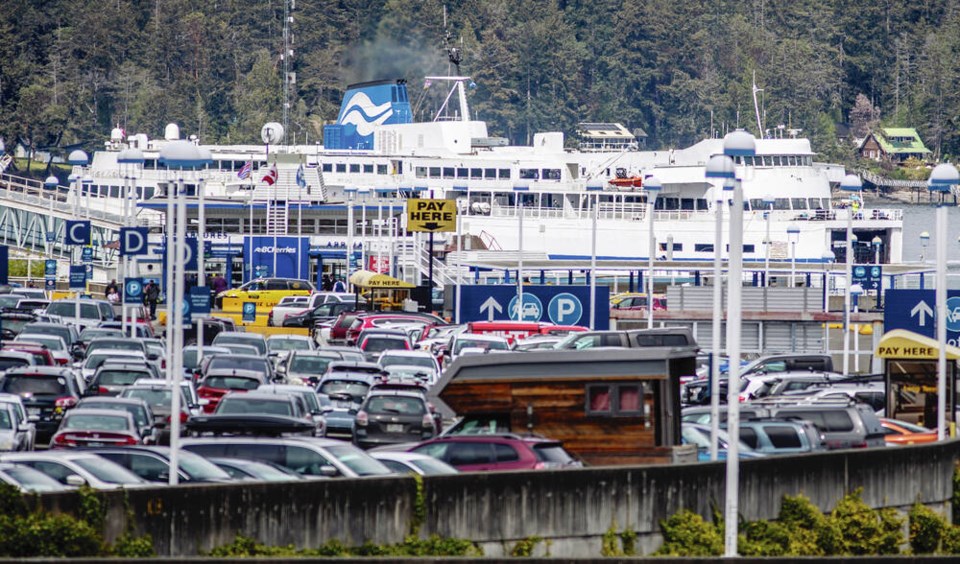As crew shortages force B.C. Ferries to cancel sailings during the peak summer season, the same problem is afflicting Washington State Ferries across the border.
In B.C., sailings have been cancelled, sometimes at short notice, when crew numbers fall below levels set by Transport Canada, while Washington State Ferries has been forced to adopt a scaled-back schedule on most routes to deal with lower staff numbers while meeting requirements, set by the U.S. Coast Guard.
If not enough crew members show up in required work classifications, ferries remain in dock for safety reasons.
Each ferry system is facing a shortage of skilled mariners, an aging workforce as baby boomers head into retirement, and impacts of the COVID-19 pandemic.
B.C. Ferries operates a fleet of 36 vessels and has about 5,400 employees, while Washington State Ferries runs 21 vessels and has 1,900 employees.
Most recently, B.C. Ferries hired a 45-person water taxi on Sunday to carry passengers to and from Salt Spring Island when crewing shortages kept vessels in dock.
It was just the latest of several cancellations in the past several months due to crew shortages.
B.C. Ferries posted a caution at 9 a.m. on Monday that the Salish Eagle’s afternoon sailings might be cancelled by crew shortages but later announced enough workers had been found to go ahead with those sailings between 2 p.m. and 10:05 p.m. The Salish Eagle was scheduled to make several stops in the afternoon and evening at Salt Spring Island, Tsawwassen, and at Pender, Mayne and Galiano islands.
For B.C. Ferries, there are plenty of staff but the main issue is absenteeism, spokeswoman Deborah Marshall said Monday.
Normally, the system operates with an absentee rate of five per cent but these days, it’s about 11 per cent, in part due to COVID-19.
B.C. Ferries was able to hire about 800 workers, many entry-level, through a hiring blitz this year. Many were found through hiring fairs throughout the province.
Meanwhile, both B.C. Ferries and Washington State Ferries are continuing to seek more highly trained mariners to fill specific positions.
In May, B.C. Ferries offered to pay up to $10,000 to employees who refer successful candidates in desired jobs. By the end of that month, $45,000 in referral fees had been paid, Marshall said.
B.C. Ferries is still looking for more employees in harder-to-fill categories, she said.
As for Washington State Ferries, in a notice Sunday, it said its alternate service program will last until further notice, and will help provide a “more predictable and reliable service” systemwide in the face of crewing shortages.
“WSF will attempt to add service when possible, and will provide notifications when full service can temporarily be restored to a route,” it said in the statement.
Staff numbers are at an “unprecedented” low in the organization’s 70-year-old history, it said in March.
In response, the system launched a recruitment and hiring effort to raise engine workforce numbers to pre-pandemic levels, it said, adding it will need to continue hiring and bolster training as it faces retirements and staff departures.
One challenge comes with “cultural shifts” in the workforce, as employees are less interested in working overtime and undesirable shifts, it said.
A Washington State Ferries report offers a glimpse into what occurs when not enough crew members are available. “Cancellations are only made after WSF’s dispatchers make hundreds of calls to on-call and other staff trying to fill vacancies.”
Washington State Ferries has four types of positions — licensed and unlicensed deck workers, and licensed and unlicensed engine room workers, the report said.
“Each have different considerations and constraints on scheduling and dispatch based on labour contracts, such as the distance an employee can travel to each terminal, restrictions on work hours, licences required for different routes and vessel classes and seniority considerations.”
>>> To comment on this article, write a letter to the editor: [email protected]



